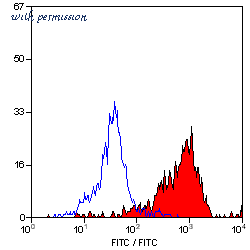product summary
Loading...
company name :
Bio-Rad
other brands :
Biogenesis, Serotec, AbD Serotec, Oxford Biotechnology
product type :
antibody
product name :
Rat anti Mouse Macrophages/Monocytes
catalog :
MCA519G
quantity :
0.25 mg
price :
384 USD
clonality :
monoclonal
host :
rat
conjugate :
nonconjugated
clone name :
MOMA-2
reactivity :
human, mouse
application :
immunohistochemistry, immunocytochemistry, flow cytometry, immunohistochemistry - paraffin section, immunohistochemistry - frozen section
more info or order :
citations: 39
| Published Application/Species/Sample/Dilution | Reference |
|---|---|
| |
| |
| Lin M, Chen T, Wallingford M, Nguyen N, Yamada S, Sawangmake C, et al. Runx2 Deletion in Smooth muscle Cells Inhibits Vascular Osteochondrogenesis and Calcification but not Atherosclerotic Lesion Formation. Cardiovasc Res. 2016;: pubmed
|
| |
| |
| |
| |
| |
| |
Wang S, Wu D, Matthan N, Lamon Fava S, Lecker J, Lichtenstein A. Reduction in dietary omega-6 polyunsaturated fatty acids: eicosapentaenoic acid plus docosahexaenoic acid ratio minimizes atherosclerotic lesion formation and inflammatory response in the LDL receptor null mouse. Atherosclerosis. 2009;204:147-55 pubmed publisher
| |
Saban M, Simpson C, Davis C, Wallis G, Knowlton N, Frank M, et al. Discriminators of mouse bladder response to intravesical Bacillus Calmette-Guerin (BCG). BMC Immunol. 2007;8:6 pubmed
| |
Monetti M, Canavesi M, Camera M, Parente R, Paoletti R, Tremoli E, et al. Rosuvastatin displays anti-atherothrombotic and anti-inflammatory properties in apoE-deficient mice. Pharmacol Res. 2007;55:441-9 pubmed
| |
Braunersreuther V, Zernecke A, Arnaud C, Liehn E, Steffens S, Shagdarsuren E, et al. Ccr5 but not Ccr1 deficiency reduces development of diet-induced atherosclerosis in mice. Arterioscler Thromb Vasc Biol. 2007;27:373-9 pubmed
| |
Espejo C, Penkowa M, Demestre M, Montalban X, Martínez Cáceres E. Time-course expression of CNS inflammatory, neurodegenerative tissue repair markers and metallothioneins during experimental autoimmune encephalomyelitis. Neuroscience. 2005;132:1135-49 pubmed
| |
Monack D, Bouley D, Falkow S. Salmonella typhimurium persists within macrophages in the mesenteric lymph nodes of chronically infected Nramp1+/+ mice and can be reactivated by IFNgamma neutralization. J Exp Med. 2004;199:231-41 pubmed
| |
Kobayashi K, Takahashi N, Jimi E, Udagawa N, Takami M, Kotake S, et al. Tumor necrosis factor alpha stimulates osteoclast differentiation by a mechanism independent of the ODF/RANKL-RANK interaction. J Exp Med. 2000;191:275-86 pubmed
|
image
image 1 :

Staining of mouse peritoneal macrophages with FITC conjugated Rat anti Mouse Macrophages/Monocytes ( MCA519FA ) following permeabilisation with Leucoperm ( BUF09 )
product information
Entity Type :
Monoclonal Antibody
Entity Category :
Antibodies
ProductCode :
MCA519G
Description :
Rat anti Mouse Macrophages/Monocytes
Specificity :
Macrophages/Monocytes
TargetSpecies :
Mouse
Host :
Rat
Format :
Purified
Isotypes :
IgG2b
Applications :
IF,F,C
ApplicationTypes :
Immunofluorescence,Flow Cytometry,Immunohistology - Frozen
Clone :
MOMA-2
Quantity :
0.25 mg
Quantity Value :
0.25
Quantity Type :
mg
Entity Formats :
FITC,Purified
UNSPSC :
41116161
Concentration :
IgG concentration 0.5 mg/ml.
Product Form :
Purified IgG - liquid.
PriceGBP :
274
PriceEUR :
384
PriceUSD :
384 USD
PriceCHF :
418
PriceSEK :
4378
PriceNOK :
4371
PriceDKK :
2864
more info or order :
company information

Bio-Rad
Endeavour House, Langford Business Park
Langford Lane, Kidlington
OXON, OX5 1GE
Langford Lane, Kidlington
OXON, OX5 1GE
antibody_sales_uk@bio-rad.com
https://www.bio-rad-antibodies.com1 800 265 7376 (North America)
44 (0)1865 852 700 (Rest of World)
44 (0)1865 852 700 (Rest of World)
headquarters: UK
Bio-Rad is one of the world's leading antibody manufacturers, offering over 12,000 antibodies and related reagents for a focused range of research areas such as immunology, cancer, veterinary research and cell biology through its antibody experts formerly known as AbD Serotec.
The range includes apoptosis kits, autophagy reagents, CD markers, epitope tag antibodies, immunology antibodies, neuroscience antibodies, and veterinary reagents.
Bio-Rad has an ISO 9001 and ISO 13485 certified production facility in the United Kingdom as well as ISO 9001 certified facilities in Germany and the United States.
Our expertise extends to traditional and recombinant antibody generation and production services. Our custom generation service delivers antibodies in as little as 8 weeks with greater than 90% success. The in vitro technology enables selection of antibodies to challenging targets, long term consistent supply, and provision of the antibody sequence.
At Bio-Rad we are committed to your success when using our antibodies and we focus on providing the technology, products and all the supporting information you need to excel in your research.
The range includes apoptosis kits, autophagy reagents, CD markers, epitope tag antibodies, immunology antibodies, neuroscience antibodies, and veterinary reagents.
Bio-Rad has an ISO 9001 and ISO 13485 certified production facility in the United Kingdom as well as ISO 9001 certified facilities in Germany and the United States.
Our expertise extends to traditional and recombinant antibody generation and production services. Our custom generation service delivers antibodies in as little as 8 weeks with greater than 90% success. The in vitro technology enables selection of antibodies to challenging targets, long term consistent supply, and provision of the antibody sequence.
At Bio-Rad we are committed to your success when using our antibodies and we focus on providing the technology, products and all the supporting information you need to excel in your research.
